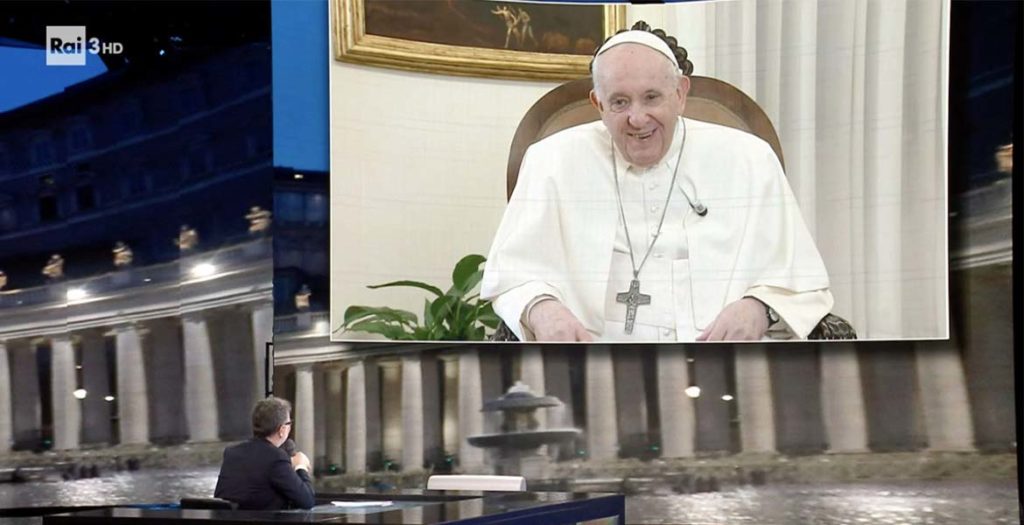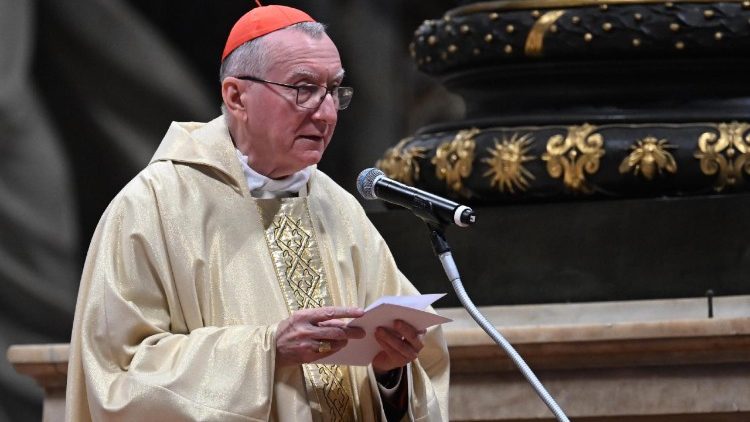Fabio Fazio Interviews the Holy Father
'As a Child, I Wanted to Be a Butcher to Earn Money'

Money also fascinated Jorge Mario Bergoglio, at least as a child, revealed Pope Francis in the course of the awaited interview given to Fabio Fazio on Sunday evening in the course of RaiTre’s broadcast “Che Tempo Che Fa.” It was a long conversation that, in addition to well-known positions of the Pontiff, a few more intimate and personal details emerged, as when he talked about the mystery of children’s suffering.
In particular, when the interviewer asked him what, as a child, he would have liked to be, he answered: “A butcher because when I went to do the shopping with my mother or with my grandmother, I saw he had an apron where he put money. And when I was asked what I’d like to do when I grew up, I would answer: “A butcher, because he has so much money.” The Pontiff also joked about his origins: “This somewhat the Genoese spirit, which I inherited from my mother. The Piedmontese are also somewhat attached to money but they dissimulate it better . . . “
Sense of Humor
If humor is, in general, a characteristic of Jesuits, it’s certainly not lacking in Pope Francis. It’s no accident that he described it as “a medicine. I pray to have a sense of humor, which makes one joyful, it makes you relativize things, it does you so much good.” The Pontiff also confirmed that he doesn’t watch television, except for individual things, especially news items (a plane crash, the Twin Towers . . . “). It is an inspiration, a renunciation that he felt he owed to God.
However, the Pope doesn’t feel he is a superhero. When Fazio asked him how he is able to endure the weight of his office, Pope Francis replied: I’m not a weight-lifting champion, I don’t put up with things so much” especially if “I’m confronted with many families that have to make an effort to pay their bills, to reach the end of the month . . . And I’m not alone, I have so many people that help me,” he said, mentioning the Bishops and personnel of the Curia.
Friendship
Another intimate detail is the importance of friendship. Does the Pope have friends? A few, but they are indispensable and, above all, “true.” I need friends. That’s why I didn’t go to live in the Papal Palace. The Popes that preceded me were Saints. I’m not that holy; I couldn’t have done it. I speak with someone here. I make friends . . . I like to live with other people.”
The Suffering of Children
The Pope revealed something very human: he doesn’t understand, as no one can, the suffering of children. “But is God evil? No. God is Omnipotent but in love. Destruction is in the hand of another, who has sowed division and destruction always. God accompanies us always, but then He leaves us free. God is strong in love. When I see children suffering, I ask myself why? There is no answer. I have faith, I try to love God who is my Father, but I don’t have an answer. The only way, in face of this suffering, is to suffer with them.” It’s a mystery that we are unable to understand.
Wars
In the course of the interview, the Holy Father touched upon many subjects, confirming positions that have already been noted. First of all, war, which he described as a contradiction of creation. A problem linked to migrations: “There is a problem of categorization, of the first and second place and the wars. I’m sorry to say it, but at present, they are in the first place. Children, migrants, the poor, those that don’t have anything to eat don’t count, they are in the lowest categories, they aren’t in the first place. What counts in the universal imagination is war. In a year without producing arms the whole world can be given to eat and given education for free, but this is in the second plane. The thought is of wars; it’s hard but it’s the truth.”
And also the relationship with the earth, the relationship between parents and children, gossip. And the curiosity linked to music. The Pope confirmed that, when he went to a record shop recently, it wasn’t to make purchases but to bless the premises of the property of old friends. “It was dark, it was night, and I went to bless the new store. There was a journalist there (Javier Martinez Brocal, Director of Rome Reports,) who was waiting for a friend, and the news came out . . . “ He also confirmed his passion for the tango. ”I also danced it: a porteño (inhabitant of Buenos Aires,) who doesn’t dance the tango isn’t a porteño . . . “
The Right of Pardon
Among more ecclesiastical topics, the Pope spoke of pardon, prayer, the Church’s challenges. “I’m going to say something that, perhaps, will scandalize, but there is a human right to pardon,” said the Pontiff. “God has made us good but free. We are free and masters to take our decisions, including erroneous ones. The capacity to be pardoned is a human right; we all have the right to be pardoned if we ask for pardon. If one has a debt with society, he must arrange to pay it but with forgiveness.”
Prayer
What is prayer? For Pope Francis “it’s what the child does when it calls its father and mother: it recognizes its limitations. God is Father, and we call Him daddy. When you get used to calling God Daddy, you are doing well. If you think that God is He who wants to burn you in hell, who doesn’t care about you, then your religion is superstition. Children pass the age of the whys. If we look well, however, a child doesn’t even wait for an answer: what he wants is his father or mother to look at him, because that gives him security. This is prayer.
Spiritual Worldliness
In regard to the future of the Church, Pope Francis referred to Saint Paul VI’s Exhortation “Evangelii Nuntiandi.” And he also said that his Exhortation “Evangelii Gaudium,” is, in this sense, wasn’t very original. It’s plagiarism of Evangelii Nuntiandi and Aparecida“ (the Document of the Conference of Latin American Bishops of which Bergoglio, among others, was a protagonist). The future of the Church is in that vision. And the risks? The Holy Father confirmed that “the greatest evil in the Church is spiritual worldliness. It’s the worst thing that can happen to the Church, even worse than the libertine Popes. Clericalism generates rigidity, and under every rigidity there is rottenness. Spiritual worldliness generates clericalism, which leads to rigid positions, where ideology takes the place of the Gospel. Clericalism is a perversion of the Church. “
The Pontiff concluded by asking once again to pray for him or, at least, if one doesn’t know how to pray, doesn’t want to or can’t, to send him “positive thoughts.” However, in asking for the alms of prayer he mentioned De Sica’s film “Miracle in Milan,” in which he played the soothsayer and read hands: “100 lire, 100 prayers.” Depp down, this is also humor.
Translation by Virginia M. Forrester
Related

Francis is gradually improving: signs of recovery at the Vatican
Exaudi Staff
04 April, 2025
1 min

John Paul II: The Tireless Pilgrim Who Continues to Inspire the World
Exaudi Staff
03 April, 2025
2 min

Pope Francis and Hope: Reflection on Jesus’ Encounter with Zacchaeus
Exaudi Staff
02 April, 2025
2 min

Technology with a Human Face: Pope Francis’ Call for Ethical and Caring Use
Exaudi Staff
01 April, 2025
1 min
 (EN)
(EN)
 (ES)
(ES)
 (IT)
(IT)

